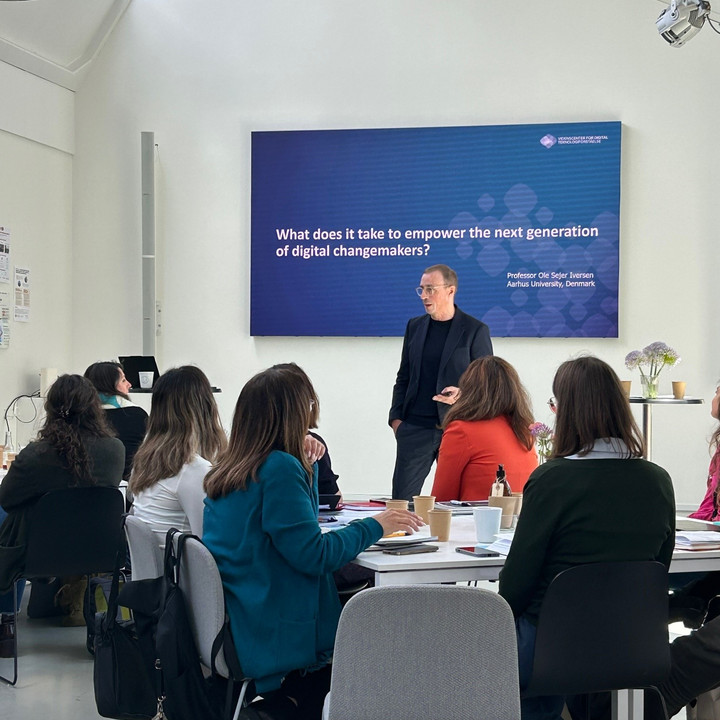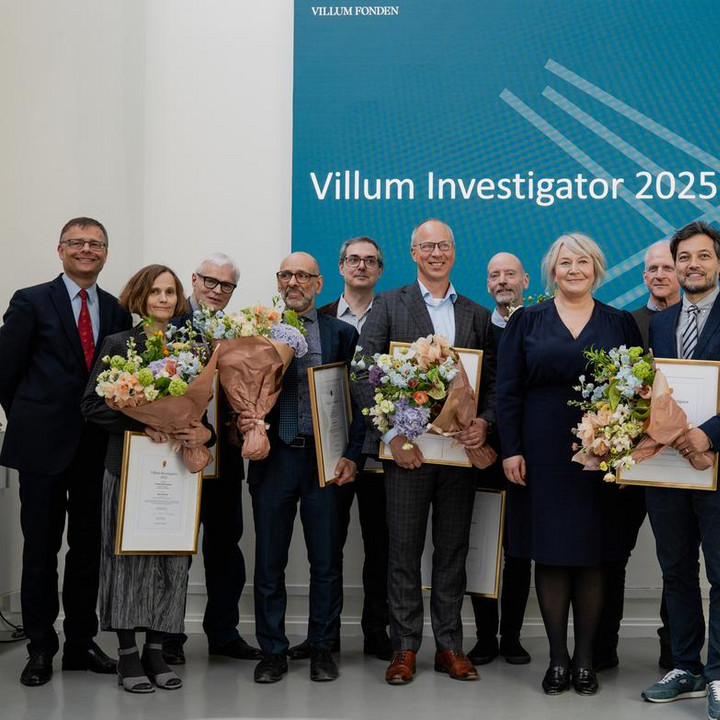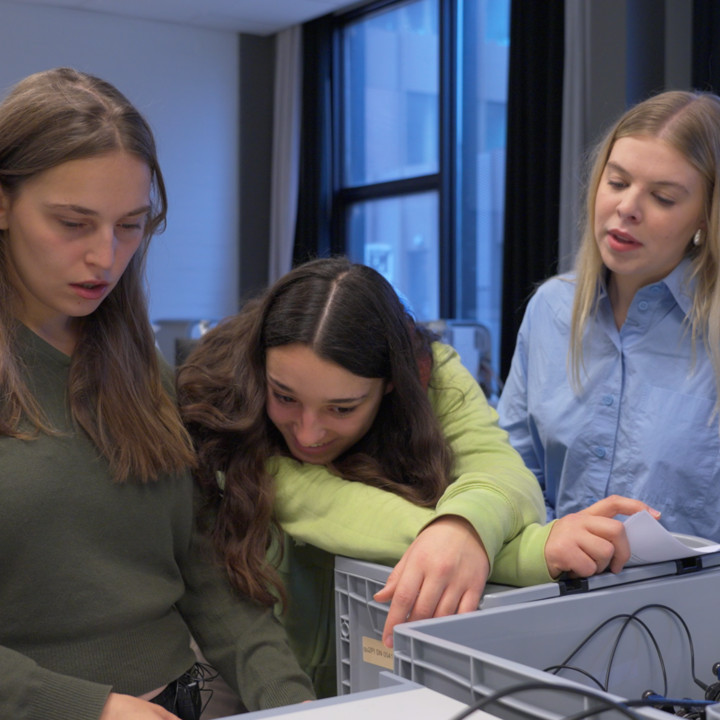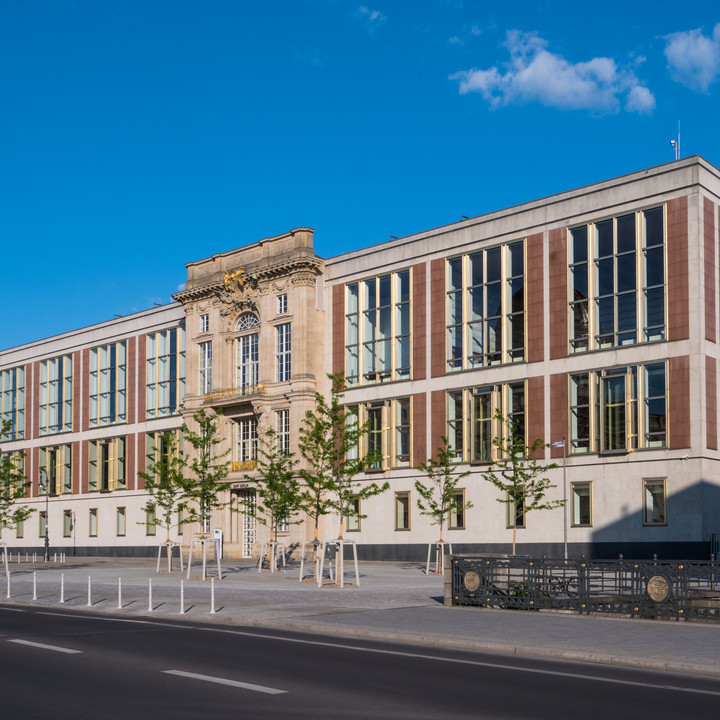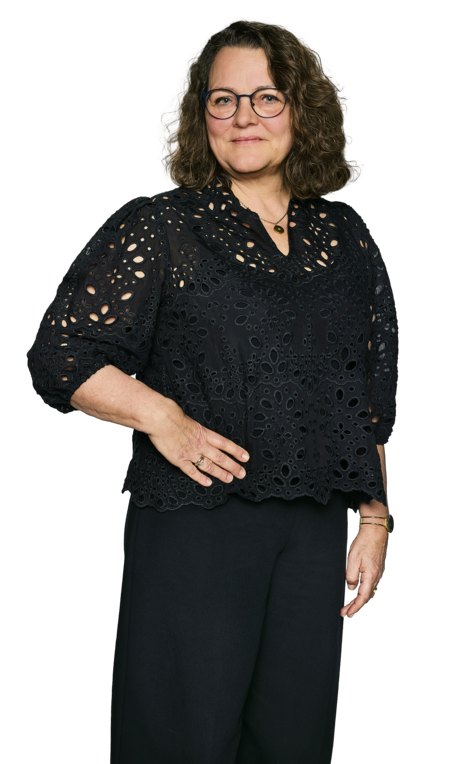Children and Young People in Seven Municipalities to Explore and Create in New Makerspaces
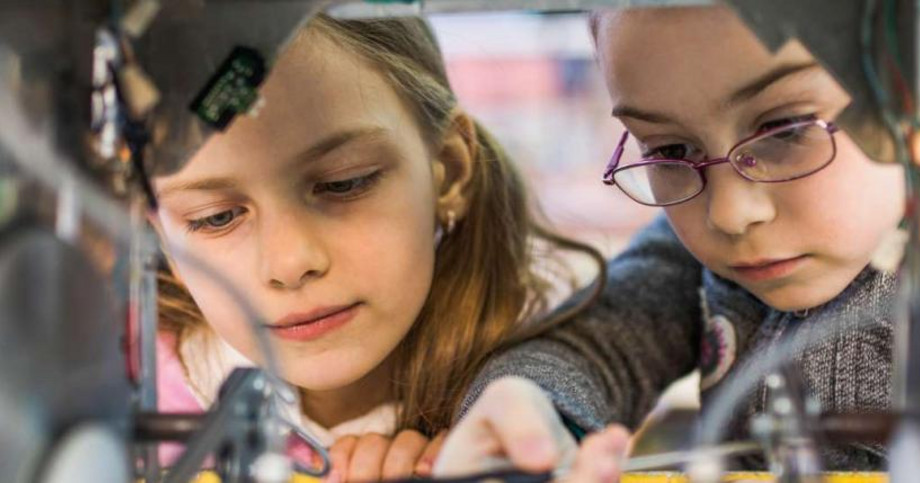
Many thousands of children and young people will have fantastic opportunities in the coming years to hack, invent, test, and design in advanced workshops, which aim to enhance their understanding of technology and digital literacy.
Seven municipalities now have a unique opportunity to combine creative and technological learning through grants from the Villum Foundation. With a total support of 37 million DKK, the municipalities of Herning, Hjørring, Kolding, Randers, Slagelse, Viborg, and Ærø will establish makerspaces where students can explore and use digital technologies to solve real-world problems.
- Since 2019, the Villum Foundation has offered an annual grant that municipalities can apply for to establish makerspaces. The idea was to give children and young people the opportunity to use, understand, and engage with digital technologies, as well as to develop practical skills.
- From 2019 to 2023, a total of 33 municipalities have received funding for the establishment of makerspaces, which, in various ways, are or will become an integral part of everyday school life. Each municipality has its own unique characteristics and strategies that the new learning spaces are designed to fit into.
- The Villum Foundation has awarded over 175 million DKK to develop and implement makerspaces in one-third of the country's municipalities.
- The Villum Foundation will continue to focus on technological understanding and learning, even though the makerspace grant is being paused for now. This will happen, among other things, through the upcoming Knowledge Center for Digital Technological Understanding, which the Villum Foundation, the Novo Nordisk Foundation, and the Lundbeck Foundation have supported with a total of 50 million DKK.
In a makerspace, students gain hands-on experience with activities such as programming, robotics, 3D printing, and design processes. These workshops foster critical and constructive thinking about technology while equipping children with practical skills.
"We find that makerspace education in schools is driven by an exploratory and creative approach to learning, through which students acquire both new skills and knowledge that are essential in an increasingly technologically advanced world. The new grants create spaces where children and young people develop fundamental skills and a deep understanding of technology's influence, enabling them not just to be tech users but also tech-literate citizens who can contribute to and shape a sustainable digital future," says Jette Hundahl Mikkelsen, fund advisor at the Villum Foundation’s children, youth, and science division.
Upcoming National Knowledge Center for Digital Technological Understanding
Alongside grants for makerspaces in municipalities, the Villum Foundation, together with the Novo Nordisk Foundation and Lundbeck Foundation, has supported a National Knowledge Center for Digital Technological Understanding with 50 million DKK over the next five years.
The center aims to establish a solid and shared expertise in digital technological understanding, grounded in Danish educational traditions and the latest international experiences.
Building on previous experiments and projects, the knowledge center will, for the first time, bring together Danish academic communities across universities, university colleges, schools, and high schools to establish a unified Danish approach to digital technological understanding in primary and secondary education (STX, HHX, and HTX).
This year's seven projects
Herning Municipality is actively working to enhance technological understanding and creative thinking among children and young people. The project will be a central part of the municipality's efforts to promote technological literacy, the use of digital technologies across all subjects, and stimulate innovative skills and entrepreneurship among all children and youth.
"Beyond establishing local Maker environments, we are eager to create a strong Maker culture for all the children and young people in the municipality. This requires, among other things, that we succeed in creating open Maker environments where technologies are visible and accessible," explains Allan Bjørnskov, Head of UngHerning and project leader for the application to the Villum Foundation.
The project involves setting up Makerspaces equipped with both digital and analog technologies in the municipality's public schools and 10th-grade classes. Additionally, a large central Makerspace is planned, which will function both as a competence development center and build on the local facilities. The central Makerspace will be located centrally within the municipality and will be established by converting existing facilities at UngHerning (the Youth School in Herning Municipality). This aims to enhance the accessibility and reach of the Makerspace.
An important aspect of the project is to establish a Maker culture and make digital technologies accessible in special education, which will promote practical skills and technological understanding.
To ensure and promote the development of a strong municipal Maker culture and increase technological understanding throughout the municipality, school leaders, IT advisors, subject advisors, teachers, and educators, as well as selected students, will undergo competence development in collaboration with CFU (resource and development centers for primary schools and other educational institutions) and VIA University College Herning.
The project targets a broad audience, including 24 schools in the municipality, a special school, and the municipal youth school. Approximately 8,800 students from grades 0-10, including those in special programs, will benefit from the project. Moreover, 30 school leaders, 100 resource persons and advisors, as well as 480 Danish and math teachers, will undergo comprehensive competence development. Additionally, 400 students will be trained as TEK agents, who can support teachers in using Maker technologies in the classroom.
Børn og Læring in Herning Municipality is the applicant behind this ambitious project, with the competence enhancement being carried out in collaboration with CFU, VIA Herning. Herningsholm EUD (Vocational Education) will also collaborate with UngHerning to offer technology-focused teaching courses to primary school classes.
This project represents a step toward creating a stronger, more technologically competent generation and increasing creative thinking among children and youth in Herning Municipality.
The Villum Foundation is granting approximately 7 million DKK to the project, which will run over a four-year period from 2024 to 2027.
With the project "Skolen ud i virkeligheden – virkeligheden ind i skolen" ("School Out into Reality – Reality Into the School"), Hjørring Municipality aims to transform schools into creative learning labs. The goal is to provide all the municipality’s children with opportunities to enhance their technological understanding, problem-based learning, practical skills, and innovation. This project represents an exciting step toward equipping children with the skills and knowledge they need in an increasingly technology-driven world.
The project will include a STEAM element (Science, Technology, Engineering, Arts, Mathematics) and involve Hjørring Musical School and Hjørring Municipality's Open School, which will help foster girls' interest in scientific subjects.
A didactic model based on real-world cases, STEAM, and sustainability will be developed as part of the project. This model will encourage further collaboration between schools and local businesses, building on existing partnerships within the municipality's "Youth Guarantee" program.
The project encompasses all 15 public schools in the municipality, covering grades 0 through 10. Hjørring Municipality expects to reach around 5,000 children, train 30 Makerspace superusers, and provide professional development for 100 teachers and 22 school leaders over the project's duration.
The expectation is that the project will strengthen and develop schools and help make children co-creators of the world they will navigate.
Hjørring Municipality will implement the project in collaboration with UCN University College, Hjørring Musical School, the municipality’s Open School offerings, and the group “Makerspace9800.” The initiative aims not only to enhance students' education but also to prepare them for future challenges and opportunities.
The Villum Foundation is granting approximately 7 million DKK to the project, which will run over a five-year period from 2024 to 2028
Kolding Municipality has been developing "fablab" competencies in schools over recent years. Now, the time is right to take new steps to advance technological understanding, practical skills, and competencies among children and young people.
A central element of the project is to equip the participating primary schools with technology packages that will help establish or expand makerspaces in schools. This initiative also includes a comprehensive skills upgrade, where staff will receive practical and didactic training to integrate the makerspace concept into daily school practice. Additionally, networks and knowledge sharing will be established, including a database with teaching resources targeted at grades 0-9.
The schools plan to implement competence development programs for two staff members at each school, provide additional support for Makerspace student patrols, secure equipment for setting up or expanding Makerspace technology packages, and establish networks with secondary education institutions.
Kolding Municipality's central Makerspace at the Pedagogical Center plays a crucial role in the project and will facilitate staff training, ensuring coherence and quality throughout the project.
The project will involve approximately 2,000 students and 30 teachers across 15 of the 24 primary schools in Kolding Municipality. This initiative aims to enhance technological understanding, creative thinking, and collaboration among children and young people.
Kolding Municipality is leading the project and collaborating with several key partners to ensure its success. This is another step toward preparing the municipality's students for a world that demands technological proficiency and curiosity.
The Villum Foundation is granting approximately 1.6 million DKK to the project, which will run over five school years from 2023 to 2028.
Randers Municipality's project focuses on shaping future generations. This initiative is a natural extension of the municipality's digitalization strategy and Children and Youth Policy, and it has three central goals in mind.
First, the project is designed to create participation opportunities for all students, with a special focus on girls, to ensure that technological understanding and creative thinking are equally accessible to everyone. Second, the project aims to motivate students by presenting authentic problems that can engage and inspire them. Finally, the project will promote students' digital literacy, so they can better understand and navigate the modern world and the challenges they face.
The project will involve all 21 schools in Randers Municipality, including 19 primary schools and two special schools. It is expected that around 5,600 students will benefit from the project during the project period, and 236 teachers will undergo extensive professional development.
The applicant behind the project is Randers Municipality, and their partner is VIA University Colleges Continuing and Further Education and CFU (resource and development centers for primary schools and other educational institutions). The project will ensure broad competence development, the establishment of networks, and the creation of local makerspaces in primary and special schools.
This project aims to equip students with technological understanding and creative thinking, which are essential skills in the 21st century.
The Villum Foundation is granting approximately 6.2 million DKK to the project, which will run over a four-year period from 2024 to 2027.
Slagelse Municipality will develop the way they educate the municipality's children and young people. The project aims to establish makerspaces in all 18 schools in the municipality and integrate the makerspace concept into teaching.
There are three overarching goals of the project:
- To build capacity in the educational staff to ensure that makerspaces and the didactic and pedagogical framework around them become an integrated part of the schools' daily teaching.
- To give students competencies in digital design, design processes, and technological capability.
- To create an educational pathway towards technical high schools and vocational education.
The project includes the establishment of a central makerspace and satellite makerspaces at all schools. Workshops and events will also be held to promote collaboration and knowledge sharing between students from different institutions.
The project's target group includes the educational staff, management, and students at the municipality's primary schools. Approximately 2,000 students will be involved in the project, and around 200 professionals will undergo extensive professional development.
The organizational structure behind the project involves various groups and representatives, including capacity groups at each school, a steering committee with representatives from schools, the municipality, ZBC (Zealand Business College), and CFU Absalon, as well as a working group with teacher representatives and a management group.
The applicant behind the project is Slagelse Municipality, and partners such as University College Absalon, CFU (Resource and Development Centers for Primary Schools and Other Educational Institutions), and Zealand Business College (ZBC) play crucial roles in the project's implementation.
This is a step towards a more innovative and technologically competent future for children and young people in Slagelse Municipality.
The Villum Foundation is granting approximately 6.97 million DKK to the project, which will run over a period of 4.5 years from 2024 to 2028.
In Viborg Municipality, they are taking an exciting step toward shaping the future of education for children and young people. With the project, they aim to introduce technology and develop technological competencies among the municipality's students.
The project builds on previous experiences and collaboration with VIA University College - CFU (Resource and Development Centers for Primary Schools and Other Educational Institutions), and it aims to embed technology and makerspaces closely within local school practices. They will build capacity among the educational staff and school leaders at the middle level while establishing makerspace areas in all 24 schools in the municipality. The project will be integrated into the municipality's overall strategy for the School of the Future.
To realize the initiative, they have sought support for the establishment of makerspace areas in all 24 schools, including special schools, as well as for capacity building for school leaders, operational staff, and subject teams. Annual knowledge fairs will also be held where leaders and teachers can meet and share their knowledge. Meebook, the schools' learning platform, will be used to share information and teaching materials.
The target group for the project includes 5,054 students at the middle level and 24 school leaders, 24 people responsible for daily operations, and 48 subject teams, representing a total of 236 staff members with expertise in subject matter and technical knowledge, didactic skills, and development competencies.
Viborg Municipality will carry out the capacity building in collaboration with VIA - CFU (Resource and Development Centers for Primary Schools and Other Educational Institutions).
For the municipality, this is a step toward equipping the children and young people with the necessary skills to face future challenges in a technological world.
The Villum Foundation is granting approximately 7 million DKK to the project, which will run over a period of four years from 2024 to 2028.
In Ærø Municipality, the goal is to unify all educational levels in a joint effort to enhance technological understanding and creativity among the municipality's children and young people. This will be achieved by focusing on the development of a central makerspace environment. The foundation is solid, as the environment is already underway as a grassroots project at the Motorfabrikken Marstal, owned by the non-profit foundation Fonden Motorfabrikken Marstal. The makerspace project, which spans three years, has the potential to transform the educational landscape and create new opportunities for future generations.
To ensure the project's success, one and a half FabLab managers will be hired, whose main task will be to create optimal conditions for all children and young people to benefit from the makerspace and enhance their technological understanding. Additionally, 19 educators will be trained to collaborate with the local business community to create learning programs that are well-rooted in the local environment.
The project also introduces a pioneer model, where four pioneers from different educational units will be trained at FabLab RUC at Roskilde University. These pioneers will play a crucial role in training and mentoring an additional 15 local educators as FabLab pilots.
The target group for the project includes Ærø's primary school students and no fewer than 647 children and young people. Initially, the four pioneers will be trained so they are equipped to guide and enhance technological understanding among the local educators.
The competence development of the project's pioneers will be managed by FabLab RUC, and the project is an example of how collaboration and technology can advance education and innovation.
The Villum Foundation is granting approximately 1.4 million DKK to the project, which will run over a three-year period from 2024 to 2026. The municipality is seeking co-financing from other foundations to cover the salaries of the FabLab manager and assistant during the project's three-year duration.
